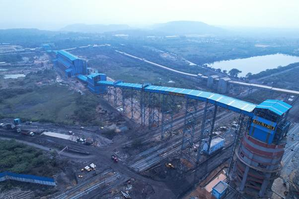New Delhi, Feb 22 (IANS) The newly commissioned Dipka Megaproject of South Eastern Coalfields Ltd (SECL) in Chhattisgarh has successfully commenced operations for new silos towards eco-friendly coal evacuation under the First Mile Connectivity (FMC) initiative, the government said on Saturday.
The Dipka Megaproject commenced new operations by loading the first coal rake from its newly-built Rapid Loading System and Silos 3 and 4, marking a major step in boosting eco-friendly and efficient coal transportation, according to a statement by the Ministry of Coal.
The ‘Dipka CHP-Silo FMC’ project has an annual coal evacuation capacity of 25 million tonnes.
Coal India subsidiary SECL, under the guidance of the Ministry of Coal, is accelerating efforts to enhance safe and sustainable coal evacuation from its mines through first-mile connectivity (FMC) projects.
Before the commissioning of the new silo, Dipka relied on a Merry-Go-Round (MGR) dispatch system with a capacity of 15 MTPA.
“With the commissioning of Silo 3 and 4, Dipka’s total coal dispatch capacity has now surged to 40 million tonnes per annum, effectively aligning transportation infrastructure with production levels,” the ministry said.
Under the guidance of the ministry, SECL has prioritised the development of FMC infra under the PM Gatishakti Plan. SECL has undertaken 17 FMC projects with a cumulative capacity of 233 MTPA.
Out of these, nine projects with a total capacity of 151 MTPA have already been commissioned, demonstrating the company’s commitment to modernising coal transportation.
The remaining eight FMC projects of 82 MTPA capacity are under various phases of development with a target to commission them in the next 2-3 years.
The implementation of FMC infrastructure at Dipka brings multiple benefits, like improved efficiency and accurate loading, minimising both underloading and overloading of coal in rakes, faster loading times leading to shorter turnaround time and improving rake availability and enhanced coal quality.
It also reduces dependence on road transport, leading to savings on diesel expenses and a cleaner environment.
–IANS
na/vd

































